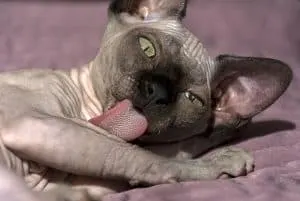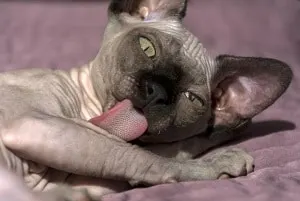 When people think of cats, they often picture fluffy cats licking their fur all day long. However, when it comes to hairless cats, is that really the case? After all, there is very little to groom. The reality is that hairless cats have different needs pertaining to personal hygiene. So, do hairless cats lick themselves?
When people think of cats, they often picture fluffy cats licking their fur all day long. However, when it comes to hairless cats, is that really the case? After all, there is very little to groom. The reality is that hairless cats have different needs pertaining to personal hygiene. So, do hairless cats lick themselves?
Hairless cats lick themselves. They lick themselves in an attempt to maintain the cleanliness of their tiny hairs and skin. Hairless cats groom just like normal cats.
While Sphynx cats make an effort to be hygienic, it’s still necessary for their owners to provide additional grooming and bathing care. Especially since these cats have oily skin, you’ll want to make sure they get as clean as possible. In this article, we’ll talk a little more about why cats lick themselves, and how the process works for hairless cats too.
Do All Cats Lick Themselves
Self-grooming is deeply ingrained in feline behavior. All cats lick themselves, whether they are long-haired, short-haired, or hairless.
Sphynx cats were bred to replace a traditional coat with a layer of tiny, invisible hairs. However, breeding didn’t eliminate the ancient instinct to lick their fur clean.
Cats don’t lick themselves just to get clean. Your cat could be grooming itself to cool down, stimulate circulation, or calm down.
How Much Time Do Cats Spend Grooming
Cats spend 15-50% of their time grooming themselves. Their constant licking usually isn’t a cause for concern.
If you notice your cat grooming in excess, take it to the vet for a quick checkup. Your cat could be overgrooming because of allergies, parasites, skin issues, or pain, to name a few.
Plus, your kitty’s constant licking could be tearing out excessive amounts of hair or, if it’s hairless, damaging its skin.
Besides your veterinarian’s treatment, you can engage in frequent playtime with your cat or introduce new cat furniture to distract it from grooming. This is especially important to implement when your cat is over-licking due to behavioral issues.
Do Cats Really Get Clean When They Kick Themselves
A cat’s tongue is incredibly effective in removing dirt and debris from their coat, thanks to the papillae that cover it.
Papillae are tiny spikes made of keratin, which is also found in human fingernails and hair. They help to separate the hairs and filter out anything your kitty may have picked up around the house or outside.
In the case of the average housecat, self-grooming is all it needs to stay clean. Hairless cats, however, need their owners to give them a bath to remove dirt from their skin effectively.
Do Cats Stop Grooming Themselves
As cats grow older, become overweight, or fall ill, it becomes harder for them to self-groom. Sometimes, if they’re in enough pain or are no longer flexible, they’ll stop grooming altogether.
It’s important to take action immediately if your cat has stopped grooming. Without daily grooming, your cat will suffer hygienically—its hair will become matted and produce a strong odor.
Brush your cat gently to encourage them to groom. When you see your cat grooming itself, give it space and time to do so.
Why Do Cats Suddenly Stop And Kick Themselves
If your cat suddenly drops whatever it’s doing and starts to lick itself, it’s likely using grooming as a self-soothing mechanism.
Self-grooming, for cats, is a repetitive and dependable activity that releases endorphins. Even if your cat seems like it really can’t get any cleaner, it’s probably just licking itself to unwind and relieve stress.
Do Hairless Cats Have Rough Tongues
Hairless cats, like other household cats, have sandpaper-like tongues.
Cat tongues are rough in order to detangle hair and trap debris. Hairless cats did not lose this physical trait as the papillae serve a purpose in addition to being great cleaners.
The papillae are necessary for all cats to grasp and eat their prey. My kitties are able to catch slippery salamanders outdoors, thanks to their barb-shaped papillae.
Do Hairless Cats Have To Be Bathed
Hairless cats need to be bathed regularly because they lack a thick coat to absorb the oil on their skin.
With no means of absorbing excess oil, the Sphynx cat’s skin attracts a ton of dirt. Even with daily vigorous licking, the Sphynx cat still needs a weekly bath.
You don’t necessarily need a bathtub to bathe your Sphynx cat—a small sink will work. Just remember to use warm water.
When bathing your Sphynx, you’ll need to thoroughly lather a pet-friendly soap all over its body besides the face. Dr. Bronner’s pure-castile soap, an all-natural, multi-purpose soap, works wonders to remove dirt and is entirely safe for bathing animals.
To wash your cat’s face, take a wet washcloth, and gently wipe until clean. If the dirt doesn’t budge, rub a little coconut oil on it. Coconut oil is safe for your cat to ingest and anti-microbial, so it acts as a non-toxic cleaning agent.
5 Ways To Help Groom A Hairless Cat
Even without a bushy coat, hairless cats have a lot of grooming to do. The most vital practices to maintain a hairless cat’s personal hygiene have to be done by its owner.
These practices are necessary for your cat’s mental and physical wellbeing. To stay on track, put them in your calendar, or set reminders on your phone.
Brush its Teeth
Believe it or not, cats need their teeth scrubbed, especially if their diet consists of wet food! Wet food doesn’t rub the teeth clean when chewed; many house cats acquire gum disease relatively young.
Even if you feed your cat dry food, buy it dental treats, or give it bones and turkey necks to chew on, it can develop gum issues. Even with TLC, my kitties had gum inflammation and redness by the time they were one year old.
Like any other cat, hairless cats need to have their teeth brushed to maintain their oral health. Any travel-sized toothbrush will work for daily brushing. Chewy has a wide selection of meat-flavored toothpaste. Begin by getting your kitty used to something rubbing around in its mouth; place some toothpaste on your finger and scrub its teeth and gums.
Clean its eyes
Most eye discharge is natural and not a sign of illness. However, your hairless kitty has no way of getting rid of it; sometimes, it may be slightly impairing its vision.
As a daily practice wet a washcloth with warm water and wipe your cat’s eyes from the inner corner outwards. Never wipe eye discharge away with your hands—you don’t want to introduce bacteria into the eye!
If your cat has a viral infection or conjunctivitis, make sure not to wipe both eyes with the same cloth or cotton ball, as not to infect the healthy eye.
Clean its ears
Many owners don’t think to clean their cat’s ears often, if at all. If your cat isn’t prone to wax build-up or ear infections, it’s not necessary to do so.
However, much of the dirt your hairless cat picks up settles in or around the ears. While your cat may not be visibly bothered by the grime in its ears, it doesn’t hurt to remove it every once in a while.
Using a Q-tip is not recommended as you can do severe damage to the ear canal. Instead, purchase a pet ear cleaning solution from your vet. Squeeze the solution in each of your cat’s ears and wipe up any excess. Allow your kitty to shake its head and gently remove the remaining solution and dirt with a cotton ball.
Cut its nails
Clipping your cat’s nails is especially essential for an indoor Sphynx. Not only do you want to protect your belongings from being shredded, but you need to protect your Sphynx’s skin from damage as well.
When scratching, a Sphynx could accidentally break its delicate skin if its nails are too sharp.
You’ll need to clip your hairless cat’s nails frequently—every week, if not twice a week.
Nail caps are an appealing and safe option; they’re low maintenance and stick on for a month.
Apply Moisturizer and Sunscreen
As they lack a thick and protective coat, Sphynx cats need a spa day, every day. Their skin is incredibly prone to dryness and sunburn.
Coconut oil is an excellent natural moisturizer. Rub a small amount all over your hairless cat; this works great to loosen up any remaining dirt. Make sure to do this when the sun is setting or has already set, as coconut oil doesn’t effectively block UV rays.
Apply a natural pet sunscreen to your Sphynx during the day. Many pet sunscreens also contain natural moisturizing agents.
Final Thouts
Many people adopt hairless cats solely because they believe they’ll require less maintenance. These owners quickly find that, while their cat doesn’t leave their hair all over their clothes, they need to spend much more time on its daily hygiene.
It can be relaxing and even fun for owners to spend extra time grooming their cat. Animal lovers see it as just another opportunity to show their kitty some extra love and care.

My name is James, and welcome to FAQCats!
Along with our team of cat owners, expert pet enthusiasts, and pet professionals, we aim to write engaging helpful, engaging content about cats. At FAQCats we strive to provide content that’s accurate and fun to read. Our team writes about everything related to cats; even the most complex of topics. Through extensive research and caring for our own fur-pals, we’re able to provide something cat owners worldwide will love. Have a look around, and leave us feedback anytime!

